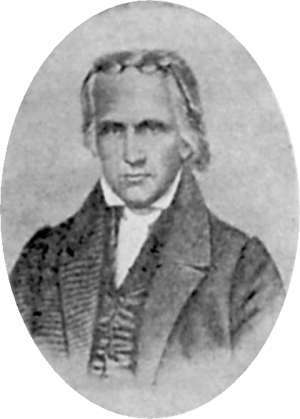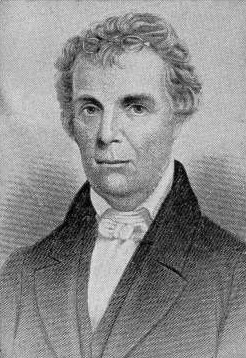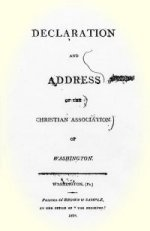 In 1809, Thomas Campbell’s fiery sermons about Christian unity and his very public convictions that all Christians should return to a pure and simple form of New Testament Christianity got him censured by his presbytery and then fired by the Synod in Western Pennsylvania. A couple of years earlier, Barton Stone, a Presbyterian minister in Kentucky, dissolved his presbytery to unite with everyone who would simply be known as Christians and base their beliefs solely on the inspired Word of God.
In 1809, Thomas Campbell’s fiery sermons about Christian unity and his very public convictions that all Christians should return to a pure and simple form of New Testament Christianity got him censured by his presbytery and then fired by the Synod in Western Pennsylvania. A couple of years earlier, Barton Stone, a Presbyterian minister in Kentucky, dissolved his presbytery to unite with everyone who would simply be known as Christians and base their beliefs solely on the inspired Word of God.
Both Stone and Campbell had a bold vision. It was a mind-blowing, earth-altering vision. Christians only. Unity in Christ. For the sake of the world. Putting aside party zeal and tearing down denominational walls, these men dreamed and prayed about the one Church we read about in our Bible. The one Church Jesus prayed for the night he was betrayed. The physical and tangible unity of Christ’s Church that proves to the world that he really is the Messiah.
Bold vision.
It was risky. It was dangerous. It was career-ending. It cost them their jobs. It cost them many relationships with family and friends and professional colleagues. But they valued the Scriptural doctrine of unity more than they valued the denominational things that divided.
They went into this thing knowing how difficult the road would be. But they believed they were acting in concert with the bold moves of Jesus’ disciples who’d gone before. They were only doing what they thought needed to be done in order to be pleasing to God. In Campbell’s Declaration and Address, long regarded as the founding document for Stone-Campbell Restoration Movement churches, he writes that they would never be dissuaded by men from their attempts at restoring the unity of the body of Christ:
“Indeed, should christians cease to contend earnestly for the sacred articles of faith and duty once delivered to the saints, on account of the opposition, and scanty success, which, in many instances, attend their faithful and honest endeavours; the divine cause of truth and righteousness might have long ago been relinquished.”
Knowing the road to Christian unity would be paved with potholes of preference and prejudice, knowing that they would face the intimidating forces of sectarianism and the walls of tradition, knowing they would be basically starting over from scratch with nothing but Holy Scripture and the grace of God, Campbell sums up their charge for unity in God’s Church by saying,
“What, shall we pray for a thing and not strive to obtain it! Sincerely and humbly adopting this model, with an entire reliance upon promised grace, we cannot, we shall not, be disappointed.”
Bold vision. Bold men.
 Does their story—no, our story!—have any implications for God’s children today? Does it mean anything? This is our heritage. It’s our history. These are our 200-year-old roots. This is our legacy: unity with God in Christ and unity with all those who call on the name of the Lord; profess Christ Jesus as Savior and King; are baptized into his death, burial, and resurrection; and celebrate that salvation around his table on his day.
Does their story—no, our story!—have any implications for God’s children today? Does it mean anything? This is our heritage. It’s our history. These are our 200-year-old roots. This is our legacy: unity with God in Christ and unity with all those who call on the name of the Lord; profess Christ Jesus as Savior and King; are baptized into his death, burial, and resurrection; and celebrate that salvation around his table on his day.
“Not that we judge ourselves competent to effect such a thing; we utterly disclaim the thought. But we judge it our bounden duty to make the attempt, by using all due means in our power to promote it; and also, that we have sufficient reason to rest assured that our humble and well-meant endeavors, shall not be in vain in the Lord.”
Amen.
Allan

Leave a Reply